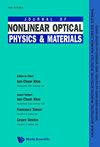Magnetic-field-controlled growth of magnetoelastic phase domains in FeRh
IF 2.3
4区 物理与天体物理
Q2 OPTICS
引用次数: 1
Abstract
Magnetic phase transition materials are relevant building blocks for developing green technologies such as magnetocaloric devices for solid-state refrigeration. Their integration into applications requires a good understanding and controllability of their properties at the micro- and nanoscale. Here, we present an optical microscopy study of the phase domains in FeRh across its antiferromagnetic–ferromagnetic phase transition. By tracking the phase-dependent optical reflectivity, we establish that phase domains have typical sizes of a few microns for relatively thick epitaxial films (200 nm), thus enabling visualization of domain nucleation, growth, and percolation processes in great detail. Phase domain growth preferentially occurs along the principal crystallographic axes of FeRh, which is a consequence of the elastic adaptation to both the substrate-induced stress and laterally heterogeneous strain distributions arising from the different unit cell volumes of the two coexisting phases. Furthermore, we demonstrate a magnetic-field-controlled directional growth of phase domains during both heating and cooling, which is predominantly linked to the local effect of magnetic dipolar fields created by the alignment of magnetic moments in the emerging (disappearing) FM phase fraction during heating (cooling). These findings highlight the importance of the magnetoelastic character of phase domains for enabling the local control of micro- and nanoscale phase separation patterns using magnetic fields or elastic stresses.FeRh中磁弹性相域的磁场控制生长
磁相变材料是发展固态制冷用磁致热装置等绿色技术的重要组成部分。将它们集成到应用中需要对它们在微纳米尺度上的特性有很好的理解和可控性。在这里,我们提出了FeRh在其反铁磁-铁磁相变中的相域的光学显微镜研究。通过跟踪相位相关的光学反射率,我们确定相对较厚的外延膜(200 nm)的相域具有几微米的典型尺寸,从而可以非常详细地可视化畴核、生长和渗透过程。相域生长优先发生在FeRh的主晶轴上,这是对衬底诱导应力和两个共存相的不同单元胞体积引起的横向非均匀应变分布的弹性适应的结果。此外,我们证明了在加热和冷却期间磁场控制的相域定向增长,这主要与加热(冷却)期间出现(消失)FM相分数中的磁矩对准所产生的磁偶极场的局部效应有关。这些发现强调了相域的磁弹性特性对于利用磁场或弹性应力局部控制微纳米级相分离模式的重要性。
本文章由计算机程序翻译,如有差异,请以英文原文为准。
求助全文
约1分钟内获得全文
求助全文
来源期刊
CiteScore
3.00
自引率
48.10%
发文量
53
审稿时长
3 months
期刊介绍:
This journal is devoted to the rapidly advancing research and development in the field of nonlinear interactions of light with matter. Topics of interest include, but are not limited to, nonlinear optical materials, metamaterials and plasmonics, nano-photonic structures, stimulated scatterings, harmonic generations, wave mixing, real time holography, guided waves and solitons, bistabilities, instabilities and nonlinear dynamics, and their applications in laser and coherent lightwave amplification, guiding, switching, modulation, communication and information processing. Original papers, comprehensive reviews and rapid communications reporting original theories and observations are sought for in these and related areas. This journal will also publish proceedings of important international meetings and workshops. It is intended for graduate students, scientists and researchers in academic, industrial and government research institutions.

 求助内容:
求助内容: 应助结果提醒方式:
应助结果提醒方式:


